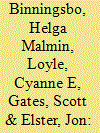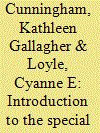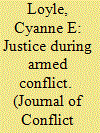|
|
|
Sort Order |
|
|
|
Items / Page
|
|
|
|
|
|
|
| Srl | Item |
| 1 |
ID:
117597


|
|
|
|
|
| Publication |
2012.
|
| Summary/Abstract |
This article introduces a new dataset on post-conflict justice (PCJ) that provides an overview of if, where, and how post-conflict countries address the wrongdoings committed in association with previous armed conflict. Motivated by the literature on post-conflict peacebuilding, we study justice processes during post-conflict transitions. We examine: which countries choose to implement PCJ; where PCJ is implemented; and which measures are taken in post-conflict societies to address past abuse. Featuring justice and accountability processes, our dataset focuses solely on possible options to address wrongdoings that are implemented following and relating to a given armed conflict. These data allow scholars to address hypotheses regarding justice following war and the effect that these institutions have on transitions to peace. This new dataset includes all extrasystemic, internationalized internal, and internal armed conflicts from 1946 to 2006, with at least 25 annual battle-related deaths as coded by the UCDP/PRIO Armed Conflict Dataset. The post-conflict justice (PCJ) efforts included are: trials, truth commissions, reparations, amnesties, purges, and exiles. By building upon the UCDP/PRIO Armed Conflict Dataset, scholars interested in PCJ can include variables regarding the nature of the conflict itself to test how PCJ arrangements work in different environments in order to better address the relationships between justice, truth, and peace in the post-conflict period.
|
|
|
|
|
|
|
|
|
|
|
|
|
|
|
|
| 2 |
ID:
157363


|
|
|
|
|
| Summary/Abstract |
Why do some postconflict states return to violence, while others remain at peace? Analysts increasingly credit postconflict justice institutions—such as truth commissions, amnesties, reparations, and trials—with contributing to the prevention of conflict recurrence following civil wars. But scholars remain divided about the overall effectiveness of these varied institutions. In this article, we directly engage this debate. We seek to overcome theoretical and data limitations that make it difficult to address the relationship between justice institutions and the likelihood that conflict will recur. We find that only postconflict justice processes that lessen conflict-induced grievances, and thus address individual motivations to rebel, are successful at keeping the peace. In a series of statistical tests using new data on postconflict justice from 1946 to 2006, we find strong support for the role of motivation-addressing processes in reducing conflict recurrence.
|
|
|
|
|
|
|
|
|
|
|
|
|
|
|
|
| 3 |
ID:
117594


|
|
|
|
|
| Publication |
2012.
|
| Summary/Abstract |
Post-conflict states represent an important research agenda for scholars studying foreign direct investment (FDI). While leaders of post-conflict states have strong incentives for trying to attract international investments, multinational corporations (MNCs) may view these states as high-risk since the reoccurrence of violence in the aftermath of civil conflict is common. Consequently, leaders of post-conflict states desperate to receive FDI to help ignite their stalled economies must convince MNCs that their state is a stable and secure place to invest in. Drawing on the recent literature that identifies the importance of domestic and international institutions for securing FDI, this article argues that post-conflict justice (PCJ) institutions can help post-conflict states attract investment. The domestic and reputation costs associated with implementing PCJ allow states to send a costly and credible signal to international investors about the state's willingness to pursue the successful reconstruction of the post-conflict zone. Under these conditions, uncertainty is lessened and foreign investors can feel more confident about making investments. Post-conflict states, therefore, that choose to implement PCJ are more likely to receive higher levels of FDI compared with post-conflict states that refrain from implementing these institutions. Statistical tests confirm the relationship between justice institutions and FDI from 1970-2001. Post-conflict states that implement restorative justice processes in the post-conflict period receive higher levels of FDI than those countries that do not implement a process.
|
|
|
|
|
|
|
|
|
|
|
|
|
|
|
|
| 4 |
ID:
177010


|
|
|
|
|
| Summary/Abstract |
Research on conflict processes has recently highlighted the myriad of tactics rebels use which are not violent in nature (cf. Petrova 2019; Ryckman 2020; Cunningham, Dahl, and Frugé 2017). Concurrently, rebel governance has drawn increasing attention from scholars and peacebuilding practitioners. In-depth historical studies of rebel groups highlight the activities and behaviors that rebels engage in beyond making war—such as providing social services and building local political institutions (Mampilly 2011; Arjona 2016a; Arjona, Kasfir, and Mampilly 2015). Complementing these works, studies have sought to provide cross-national examination of trends in these governance behaviors (Huang 2016; Heger and Jung 2017; Stewart 2018). Despite this work, quantitative and formal research in conflict processes often ignores the insights that the rebel governance literature has generated, frequently focusing exclusively on violent tactics or considering governance issues primarily as part of conflict settlement processes. In this special feature, we work to integrate the study of rebel governance with the conflict processes literature, providing a conceptual link between the two while offering novel contributions to advance our understanding of the dynamic processes of rebel governance.
|
|
|
|
|
|
|
|
|
|
|
|
|
|
|
|
| 5 |
ID:
157904


|
|
|
|
|
| Summary/Abstract |
While armed conflict is ultimately about violent interaction between combatant groups, a variety of policies are pursued in conjunction with violence that contribute to the course of conflict and its outcomes. One underdeveloped area of research is the use of judicial and quasi-judicial processes during armed conflict. These processes, including trials, truth commissions, reparations, amnesties, purges, or exiles, are directly related to the actions and abuses of the conflict itself—a phenomenon we refer to as during-conflict justice (DCJ). To enable researchers to answer questions about when and why governments and rebels resort to these strategies, and to what effect, we created a global, cross-national dataset which includes 2,205 justice processes implemented during 204 internal armed conflicts between 1946 and 2011. Using these data, this article investigates the conditions under which governments and rebels employ DCJ as well as the potential effects of DCJ usage on conflict dynamics and outcomes.
|
|
|
|
|
|
|
|
|
|
|
|
|
|
|
|
| 6 |
ID:
177014


|
|
|
|
|
| Summary/Abstract |
Research on rebel behavior focuses on the violent conduct of these groups. Work on rebel governance, however, has documented the myriad ways in which rebel groups seek to gain legitimacy, project strength, and govern civilian populations beyond direct violence. These efforts stress the importance of governance institutions for securing cooperation and compliance from the civilian population, a central concern for rebel groups. Judicial processes are one avenue through which this cooperation and compliance can be secured. These efforts encompass a range of processes including ad hoc trials, truth commissions and commissions of inquiry, offers of amnesty, and reparations programs. Using new data on the rebel use of judicial processes from 1946 to 2011, I examine the argument that rebel judicial processes can best be understood as a mobilization strategy by the group, offering concessions to a supportive civilian population or coercion when support is weak.
|
|
|
|
|
|
|
|
|
|
|
|
|
|
|
|
| 7 |
ID:
156192


|
|
|
|
|
| Summary/Abstract |
Despite dynamic discussions of research methods within political science, there has been comparatively scarce attention paid to the possibility and effect of research-related trauma—the trauma experienced by individuals working on issues and data related to violence and death. There are many activities within the field of political science that put members of the profession directly at risk for this form of trauma. In this article, we draw attention to the possible risks of research-related trauma for scholars, graduate students, and research team members, and offer some recommendations for best practices in what can be a challenging discipline.
|
|
|
|
|
|
|
|
|
|
|
|
|
|
|
|
| 8 |
ID:
173208


|
|
|
|
|
| Summary/Abstract |
Scholars of political violence often face problems concerning data availability. Research on the perpetrators of that violence is no exception. Over the past 40 years we have made great strides in understanding who joins in violent action and why, yet have rarely probed the representative nature of the subjects queried or contemplated the implications of this sampling for our conclusions. It is generally assumed that those left to ‘tell the tale’ about what transpired are representative of those who participated in the violence. In this article, we use the context of the 1994 genocide in Rwanda to probe questions about which perpetrators of violence we include in our research and subsequently, who we miss. We theorize an often overlooked group of perpetrators, the ‘murderers in the middle’, who take orders from above, mobilize others to kill, and zealously participate themselves. We contend that this group of perpetrators is potentially unique from those generally captured, identified, and studied in that they are likely to have actively and willingly engaged in violence for personal gain as well as for ideological reasons. Systematically missing groups of perpetrators has potential implications for research on participation in mass violence as well as our understanding of why this behavior occurs.
|
|
|
|
|
|
|
|
|
|
|
|
|
|
|
|
|
|
|
|
|